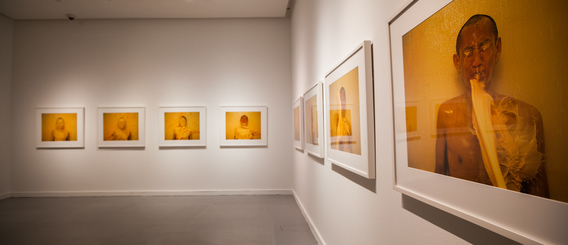
R
E
V N
E
X
T
Performance art pioneer LEE WEN passed away on March 3. Image via iPreciation, Singapore.
Performance art pioneer Lee Wen passed away in the afternoon of March 3 in Singapore.
Born in 1957 in Singapore, Lee was an important proponent of contemporary art in his birth country. Utilizing media including performance, interactive installations, video and photography, he tackled questions of identity, how we perceive the world around us, and the role of art in society.
From a young age, Lee created drawings with accompanying narratives. In 1981, A Walking Dream, a compilation of his drawings and texts illustrating a protagonist’s encounter with “reality,” was published by Select Books. However, it wasn’t until 1987 that Lee quit his job in finance to pursue art full time, enrolling in an undergraduate degree at the Lasalle-SIA College of the Arts, where he met prominent contemporary artist Tang Da Wu. After his graduation, Lee moved into The Artists Village—a haven established by Tang in 1988 for experimental and alternative artistic practices that changed the course of Singapore’s art history—and probed performance as a medium.
During the early 1990s, while completing his diploma in art and design at the City of London Polytechnic, Lee created his seminal “Yellow Man” character, for which he is widely recognized. Prompted by his experience living in a predominantly white society where he was confronted with racism and stereotyping, he stripped to his briefs and covered himself in yellow paint. “Yellow Man” appeared and evolved over many of Lee’s subsequent performances including works deconstructing oppressive social prejudices within Singapore, and exploring Buddhism and Freudian psychology. Lee continued to practice performance art throughout the 1990s, despite the National Arts Council’s (NAC) decade-long campaign to discourage performance art by withdrawing funding after Josef Ng’s controversy-raising 1994 event that featured a brief scene of him snipping his pubic hair.
Besides participating in numerous international festivals and exhibitions with his work, Lee championed performance art by establishing the Future of Imagination international performance art event in Singapore in 2003. In 2009, he co-organized RITES – Rooted in the Ephemeral Speak, a platform to support and develop performance art practices, discourse, infrastructure, and audiences. Lee established Singapore’s Independent Archive (IA) in 2012 to document performance art in the region, and the materials he collected (photographs, videos, writings, sketchbooks and other relevant materials) will be integrated into NTU CCA Singapore’s Public Resource Platform and accessible at CCA, IA, and Asia Art Archive in Hong Kong.
Lee Wen was the subject of a 2012 midcareer retropective at the Singapore Art Museum, “Lucid Dreams in the Reverie of the Real,” which explored the artist’s expansive practice, through more than 40 installations, photographs and videos. In 2005, the NAC awarded Lee with a Cultural Medallion for his contributions to the development of contemporary art in Singapore, and in 2016, Art Stage Singapore and the United States Embassy presented him with the Joseph Balestier Award for the Freedom of Art.
To read more of ArtAsiaPacific’s articles, visit our Digital Library.













